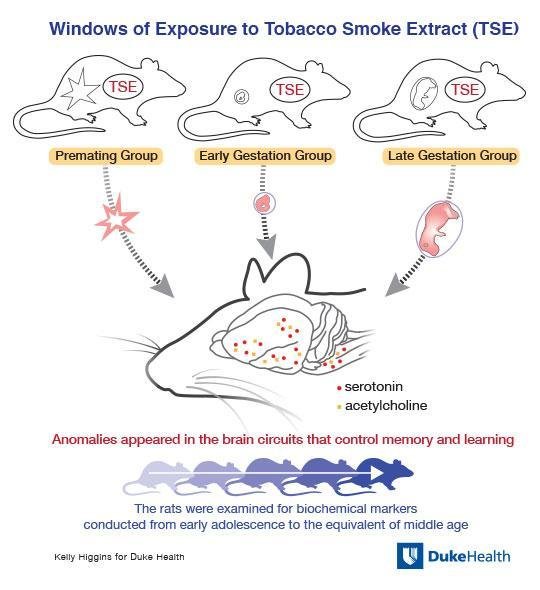Researchers at Duke University Medical Center have found that exposure to secondhand smoke in laboratory rats prior to conception can negatively effect the fetus. Kelly Higgins/Duke Health
DURHAM, N.C., Jan. 5 (UPI) -- Researchers at Duke University Medical Center have found that a mother's exposure to secondhand smoke prior to conception can have harmful effects on a fetus.
Researchers experimented on laboratory rats in settings designed to mimic the secondhand smoke exposures that humans experience, and found that the chemical components of tobacco smoke impact fetal brain development in all stages of pregnancy.
To simulate secondhand smoke exposure, scientists administered the chemical compounds of tobacco smoke through implanted pumps in rats.
Female rats, separated into three groups, were given the tobacco smoke extract prior to mating, early gestation or late gestation. Researchers then studied the resulting offspring in early adolescence and into adulthood.
The study showed that secondhand smoke exposure damages areas of the brain involved in learning, memory and emotional responses. Even though the most severe impacts occurred with exposure in late gestation, researchers found that negative effects of secondhand smoke on the fetuses' neuro-development happened even when mothers were only exposed before conception.
"This finding has important implications for public health, because it reinforces the need to avoid secondhand smoke exposure not only during pregnancy, but also in the period prior to conception, or generally for women of childbearing age," Theodore A. Slotkin, Ph.D., professor in Duke's Department of Pharmacology & Cancer Biology, said in a press release.
The study found that exposure to tobacco smoke extract in rats in all three study periods caused impaired function of the cholinergic brain circuits that control learning and memory, and in the serotonin circuits that affect mood and emotional behavior.
"Our study clearly shows there is no stage in which tobacco smoke is innocuous to the developing fetus," Slotkin said. "We warn women about smoking during pregnancy, and most people are aware that secondhand smoke exposure is also harmful to the fetus, but our study is the first to show that exposure prior to conception is potentially damaging, as well. The public health implications should be obvious."
The study was published in Toxicological Sciences.















